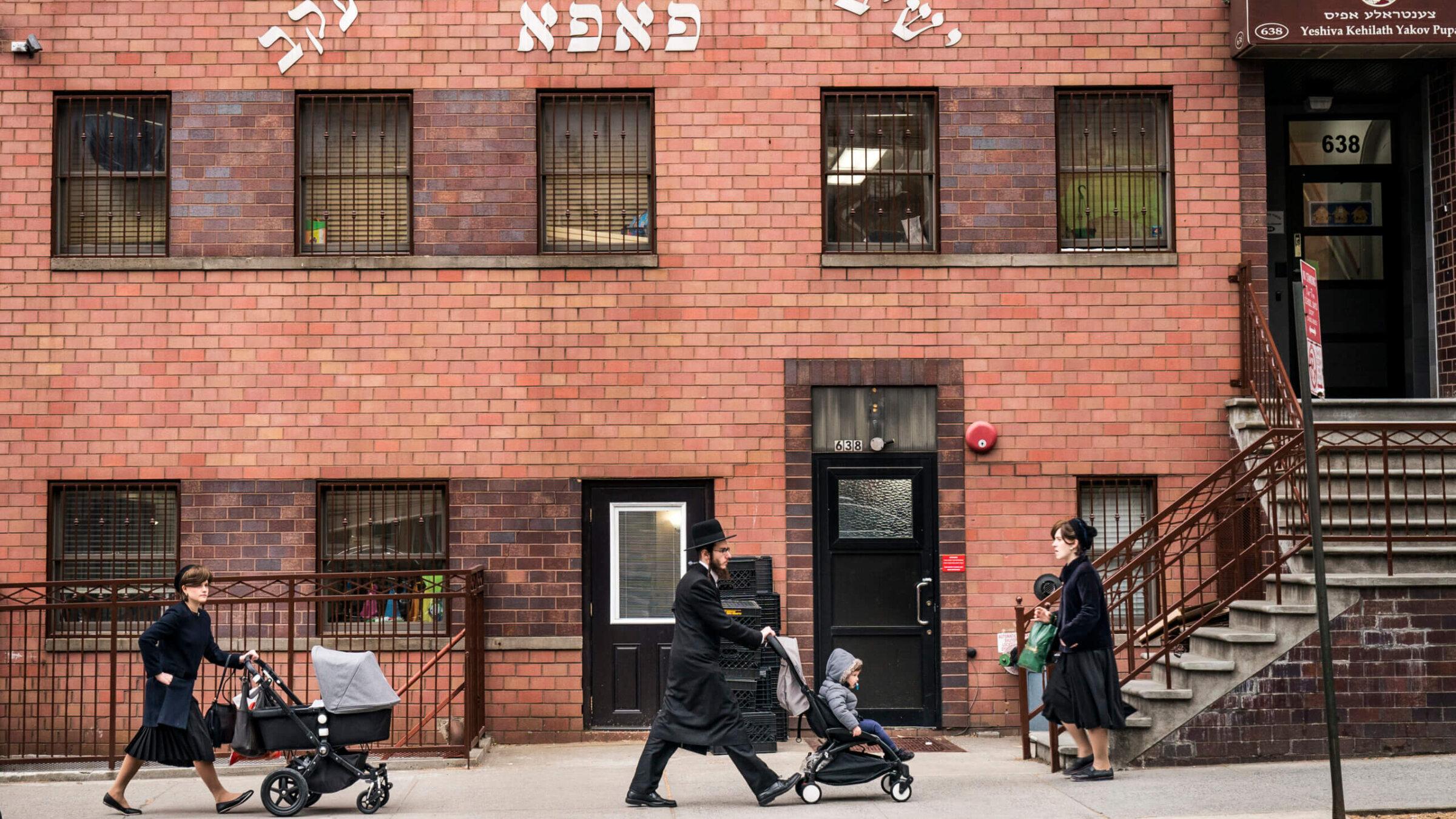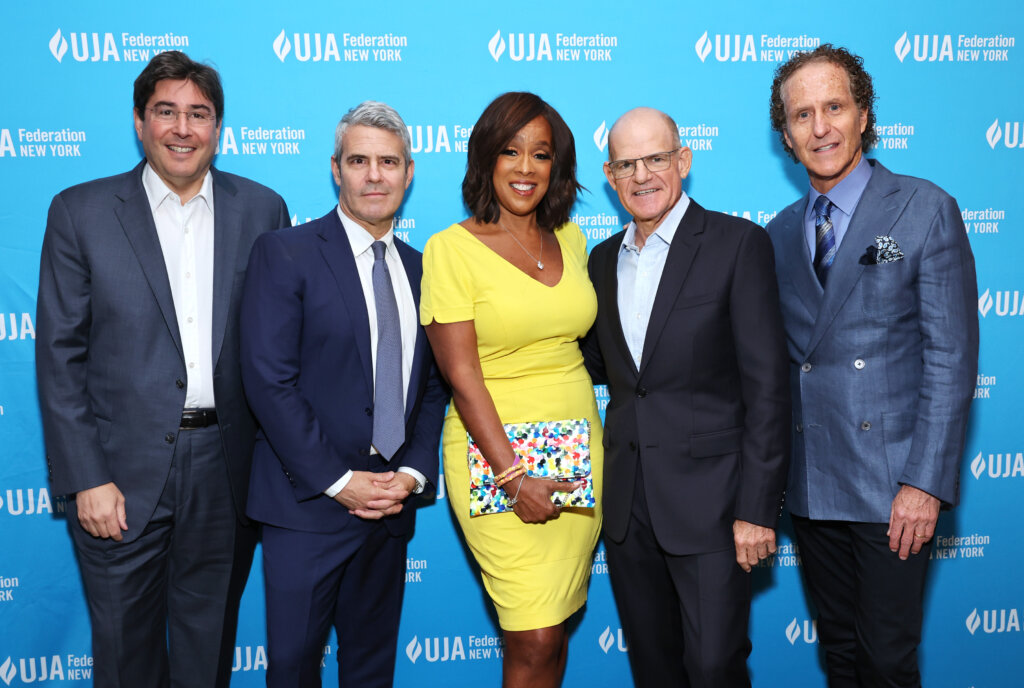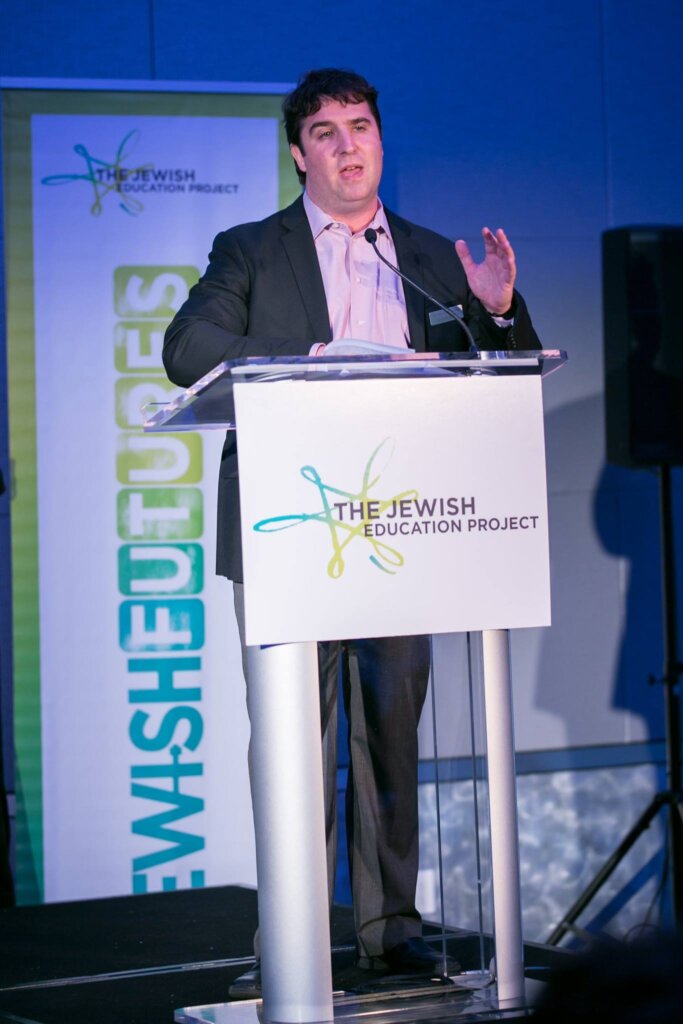How the Jewish establishment helps fund Hasidic yeshivas
UJA-Federation of New York steers 400 schools in the region toward millions in public money

Pedestrians walk past the Yeshiva Kehilath Yakov School in the South Williamsburg neighborhood in the Brooklyn. Hasidic yeshivas, which receive assistance from the UJA-Federation of New York, have been in the spotlight after a state board passed tighter regulations on private schools this week and The New York Times released a scathing investigation critical of some of the yeshivas. Photo by Getty Images
New York’s Jewish federation funds an initiative that helps Jewish schools in the region access millions of dollars in public funding, regardless of whether the schools teach secular subjects or meet state standards.
Most of this money comes in the form of government grants for professional development, educational materials and subsidized meals according to an affiliate of UJA-Federation of New York that works with the schools. Those schools include Hasidic yeshivas in Brooklyn that were the subject of a scathing investigation by The New York Times over the weekend.
The Times reported that such schools have secured more than $1 billion in government funding over the last four years. All but 1% of the boys in some of those schools who took state standardized tests failed them, according to the article.
The Jewish Education Project, which receives more than $4 million of its annual $14 million budget from UJA-Federation, helps more than 400 schools access state and federal funding. The organization seeks to notify all Jewish schools in New York City of public grant opportunities and approximately 37% of those institutions are Hasidic, according to a 2020 study.
David Bryfman, the group’s leader, said the Jewish Education Project was focused on ensuring that yeshivas were able “to access government funds which are due to them.”
“We don’t get into the business of enforcement,” Bryfman said. Unless the government has revoked a school’s registration for violating the law, he added, “we continue to offer them services to improve the education,” regardless of how they handle secular studies.
New York’s Board of Regents approved new rules Tuesday to help state officials enforce an existing law requiring private schools to offer a “substantially equivalent” education to what students would receive in public schools. The Times investigation, which was harshly criticized by many Hasidic leaders, bolstered longstanding concerns that the yeshivas do not properly prepare students for jobs and contribute to high rates of poverty in the community.
Haredi groups argued that the article overlooked the positive aspects of a rigorous Jewish education and ignored yeshiva graduates who have had successful careers.
Bryfman said that the Jewish Education Project regularly helped with professional development for teachers of secular subjects at Orthodox schools and would work to help yeshivas that are interested meet the “substantial equivalency” standard.
“We work to improve Jewish education and education for Jews,” Bryfman said, “which is not always the same thing, particularly in this particular topic.”
Sara Seligson, a managing director at the organization whose portfolio includes yeshivas, said that “in general” the group “believes that all schools should be growth-oriented learning communities.”
The group helps more than 150 schools take New York standardized exams, which are optional for private schools but help them track student progress and qualify for certain government programs, although it does not break out how many participating schools are Hasidic yeshivas as opposed to mainstream day schools.

The Jewish Education Project was the only mainstream organization to respond this week to the Forward’s inquiries about its relationship with Hasidic yeshivas. UJA-Federation of New York, which touts on its website work helping nearly 200 Jewish day schools and yeshivas secure $124 million in funding, did not respond to multiple requests for comment made by phone, email and text message this week.
UJA-Federation directly funds at least 21 Jewish schools, according to its 2021 annual report, all of which appear to offer robust general studies curriculums. At the same time, the federation in 2015 joined with Agudath Israel, an umbrella Haredi advocacy group that opposes “government intrusion” into yeshiva curriculums, in asking state leaders to reimburse low-income parents who sent their children to any private school.
The federation is the Jewish Education Project’s largest general donor, providing $4.3 million last year, according to the organization’s annual report. That was the most revenue it received from a single source by far, exceeded only by funding earmarked a voucher program for teenagers traveling to Israel. The project estimated that it spent $1.6 million on day school program expenses.
Yossi Gestetner, co-founder of the Orthodox Jewish Public Affairs Council, said that in Rockland County, where there is a concentration of Hasidic yeshivas, the local federation had recently introduced a program to help the schools enhance security but did not weigh in on curriculums or provide academic grants.
Ari Rosenblum, the federation’s chief executive, said that he would “support any kind of constructive dialogue” when it came to the discussion over standards at Hasidic yeshivas.
“Every parent has a responsibility to educate their children and to give them the tools that they need to be productive and to be functioning in society,” he said. “I don’t think anybody would argue with that.”
Broadly, Gestetner said that relationships between Haredi communities and mainstream Jewish organizations had improved over the last decade. Except on the question of yeshivas, where he said there is disagreement even among Hasidic leaders over how to respond to the recent state regulations.
“I’m not aware of Hasidic institutions, on a large scale, taking guidance or advice about what to do on education,” he said.

Prizmah, the national association of Jewish day schools and yeshivas, declined to say whether it had any membership standards regarding secular education. The group’s director, Paul Bernstein, said in an email that schools in its network “work hard to achieve high standards in both secular and Judaic studies.”
He said that because the Regents regulations had just been approved, it was unclear whether any Prizmah members would need to make changes to meet them. Bernstein declined an interview request.
The organization has about 80 member schools in its New York region, which includes northern New Jersey. While a majority of these schools are Orthodox, nearly all of them place a strong emphasis on secular classes, according to school websites. Only a small handful of the New York schools listed in a recent Prizmah report appear to be located in Hasidic neighborhoods of Brooklyn.
Bryfman, who runs the Jewish Education Project, said the organization has spent years building relationships with yeshivas “without any judgment.” He noted that the government funds the group helps the schools access are largely to improve secular education, offer student services and provide free breakfast and lunch for poor students, things he argued kids need regardless of what they’re learning in class.
“We leave it to others to determine right, wrong, law breaking, whatever,” he said. “We’re there to help the kids.”
The Forward is free to read, but it isn’t free to produce

I hope you appreciated this article. Before you go, I’d like to ask you to please support the Forward.
Now more than ever, American Jews need independent news they can trust, with reporting driven by truth, not ideology. We serve you, not any ideological agenda.
At a time when other newsrooms are closing or cutting back, the Forward has removed its paywall and invested additional resources to report on the ground from Israel and around the U.S. on the impact of the war, rising antisemitism and polarized discourse.
This is a great time to support independent Jewish journalism you rely on. Make a gift today!
— Rachel Fishman Feddersen, Publisher and CEO
Support our mission to tell the Jewish story fully and fairly.
Most Popular
- 1

Fast Forward Ye debuts ‘Heil Hitler’ music video that includes a sample of a Hitler speech
- 2

Opinion It looks like Israel totally underestimated Trump
- 3

Culture Cardinals are Catholic, not Jewish — so why do they all wear yarmulkes?
- 4

Fast Forward Student suspended for ‘F— the Jews’ video defends himself on antisemitic podcast
In Case You Missed It
-

Culture Should Diaspora Jews be buried in Israel? A rabbi responds
-

Fast Forward In first Sunday address, Pope Leo XIV calls for ceasefire in Gaza, release of hostages
-

Fast Forward Huckabee denies rift between Netanyahu and Trump as US actions in Middle East appear to leave out Israel
-

Fast Forward Federal security grants to synagogues are resuming after two-month Trump freeze
-
Shop the Forward Store
100% of profits support our journalism
Republish This Story
Please read before republishing
We’re happy to make this story available to republish for free, unless it originated with JTA, Haaretz or another publication (as indicated on the article) and as long as you follow our guidelines.
You must comply with the following:
- Credit the Forward
- Retain our pixel
- Preserve our canonical link in Google search
- Add a noindex tag in Google search
See our full guidelines for more information, and this guide for detail about canonical URLs.
To republish, copy the HTML by clicking on the yellow button to the right; it includes our tracking pixel, all paragraph styles and hyperlinks, the author byline and credit to the Forward. It does not include images; to avoid copyright violations, you must add them manually, following our guidelines. Please email us at [email protected], subject line “republish,” with any questions or to let us know what stories you’re picking up.















